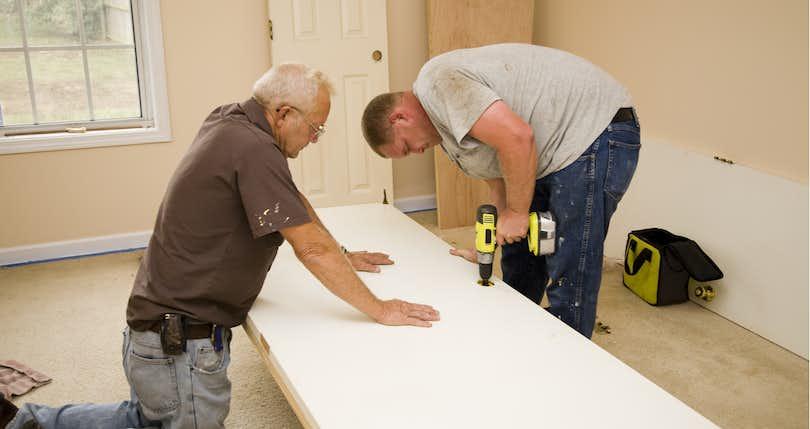Is Mississippi a good market for house flippers? And where should they invest? Our article has an overview of the Mississippi housing market, including price appreciation trends and the best cities for investment, with information on the numbers you should know to get the best deal.

Thanks to the popularity of reality shows, saying that you’re a house flipper has become a viable career. It’s fun to dream of transforming an ugly, neglected home into something beautiful, and to dream of cashing that big paycheck. If you’re an experienced contractor, you might think it would be a way to make money during the off-season.
But a lot happens behind the scenes on those popular shows, and being a successful house flipper is trickier than they make it look. Failing to budget properly for repairs could destroy your budget. If the home doesn’t sell within your anticipated timeframe, additional loan payments could erode or wipe out your profits.
Before purchasing a property to fix up and flip in Mississippi, try to plan for every eventuality. If you’re new to flipping, find a team of professionals to help make it a success. From a loan officer to contractors, to a realtor to help you find potential properties, don’t buy your first flip until you have the right people backing you up.
2019 Mississippi Housing Market Analysis
The median home value for homes in Mississippi is $128,700. They’ve risen 9.3% in the last year and Zillow predicts that they’ll rise another 4.9% in 2019.
Home values vary between cities. In Biloxi, the median home value is $137,700, and the city’s housing market grew 13.7% in values last year and will rise another 5.1% in 2019. Homes in Jackson have a lower median home value, at $52,800, and showed no growth last year. Brandon home values are at $195,800 after rising 7.7% in 2018.
Newer house flippers should partner with an experienced, local agent who knows the market intimately and who can guide you to the best cities and neighborhoods for investment.
How to Tell if a Mississippi Property is a Good Investment
There are several generic principles that apply to house flipping. Find the cheapest home in a desirable neighborhood, preferably one that only needs cosmetic touch-ups, to flip. Many investors only buy foreclosures, and Mississippi was hit hard during the last recession.
Mississippi continues to have the highest foreclosure rate in the nation, at 3.06%. Their rate is also double that of any other state. While this represents opportunity to house flippers, be very careful that you don’t buy in a neighborhood that will continue a downward spiral.
Take stock of the home’s current condition before adding it to your fix and flip portfolio. Successful flippers tend to avoid major structural repairs, such as roof or foundation issues. These repairs can mount in cost quickly and take longer to fix, eating into your profit. Make it your goal to find a home that needs more cosmetic repairs.
Before making an offer, ask your realtor to prepare a comparative market analysis. It takes data on recent home sales to analyze average sales prices and average time on the market, which can help you plan your potential profit and timeline. A novice house flipper will benefit from expert guidance when assessing prospective investment properties.
How to Turn a Profit When Flipping a Mississippi House
Never lose sight of your profit margin when considering a potential house flipping investment. Double-check all your numbers, and ask an expert to look at them, before bidding on a house.
A return on investment expresses the amount you’ll make on the money you invest as a percentage. You can calculate it by taking the current value of the home you’re thinking of flipping, subtracting its cost and then dividing by the cost.
With a house in Biloxi, it would be $137,700 less the cost of $111,390 for the mortgage and repairs, divided by the $111,390 for an ROI of 0.24%. This is a simple example using basic numbers. When calculating your own ROI don’t forget to add in realtor’s fees, closing costs, and any loan payments. Working with a low-commission realtor will help you save on some of those costs.
In flipping houses, the generally accepted 70% rule states that you shouldn’t pay more than 70% of the homes’ after repair value or ARV minus the cost of repairs.
If a home in Biloxi is worth $137,700 after repairs, multiply it by .70 to get $96,390. Then deduct the repairs it needs, say $15,000, and you’ll have $81,390. According to the 70% rule you shouldn’t pay more for the home.
Expressed as an equation, this would be $127,700 (ARV) x 0.70 = $96,390 – $15,000 (repairs) = $81,390.
This is your starting point when evaluating potential investments. If the seller demands a price that doesn’t fit the 70% rule, walk away. Even if a home meets the 70% rules, keep in mind the average time to flip or sell a home in your target city. Add the time needed for repairs to the average time a house spends on the market to get an estimate, and talk to a realtor experienced in house flipping to get their input.
Paying Cash vs. Taking Out a Loan
House flippers have different options available to them for financing their purchases, but each will impact their bottom line differently.
Fix-and-flip loans are typically only granted by hard money lenders who prefer to work with experienced flippers. Interest rates start at 12% and can rise into double digits. These short-term, interest-only loans often have terms shorter than 18 months, which can spell trouble if the home doesn’t sell quickly and the loan is due.
Flippers with excellent credit and cash for a down payment might be able to finance the purchase with a mortgage or home equity line of credit. Traditional lenders rarely waive the 20% down payment requirement for a flipper, and it’s not really worth your time to apply for a 30-year loan on a house you only intend to hold a few months.
Financing a flip by paying cash eliminates a lot of risk. If the market changes during the renovation period, you won’t feel pressured to sell at a loss to satisfy your fix and flip lender or before your loan comes due. Even if you can make payments to a traditional lender while the house is on the market the interest and principal on those payments will eat into your profit margin.
Taking out a loan increases your risk. Let’s say you purchased that house in the Biloxi example above. You paid $96,390 and took out a renovation loan at 12% interest for the repairs. Your monthly mortgage payments are $796 and your payment on the renovation loan is $362 (or more).
Repairs cost $3,000 more than expected and take four months instead of the two months you’d planned on, and then it takes six months to sell the house. Your numbers now look like this;
- Purchase loan $96,390
- Renovation loan $15,000
- Estimated payments $11,580
- Extra repairs $3,000
- Closing costs of 2%: $2,754
This equals a profit of $8,976, instead of the profit you’d wanted of $31,266. It’s still a profit, but it wouldn’t take much more going wrong for it to turn into a loss. And after a 10-month investment of your time, many wouldn’t consider it worth the bother.
3 Best Cities in Mississippi for House Flippers in 2019
Overall, the low housing prices make Mississippi a tough state for house flippers. You won’t find huge payoffs, and if you don’t carefully track expenses you could end up in the red.
The average time to flip is 220 days and the ROI for the state is only 4.3%, with profits of roughly $9,875. However, you may want to flip houses in Mississippi because you know the state well or feel more comfortable starting out with cheaper properties.
Jackson, MS ranked 23 on a list of 170 cities good for flippers, partially because the costs of remodeling and renovations were the third best. Median home values are $76,705, and have risen 25.83% since the year 2000.
Brandon home values have been rising, due in part to population growth and job growth. The unemployment rate is below the national average, and future job growth is expected to be above the national average. It has excellent schools, which tend to help property values, and low crime rates.
Madison, MS, has decent home values for flippers, with median values of $280,200. Values rose 10.4% last year, and will rise another 3.9% this year. Recent job growth has been 1.2%, and the unemployment rate is low. It’s one of the wealthier areas in the state, as median household income is $103,121. If you can find a deal to flip in Madison, it could net you a good profit.
Next Steps for Mississippi House Flippers
The reward often reflects the risk, which is to say that while you can make a lot of money flipping houses, you can also lose a lot of money. Novice house flippers will want to get all the advice they can find, and that includes leaning on an experienced real estate agent.
One of the benefits of working with Clever Partner Agents is that they work for a fraction of a realtor’s typical commission. This helps you maintain a good margin on your flip. But because they still offer full-service, they’ll get your the best price for your property. If you’re ready to learn more about flipping houses in Mississippi, contact Clever today to be put in touch with one of our expert agents.



